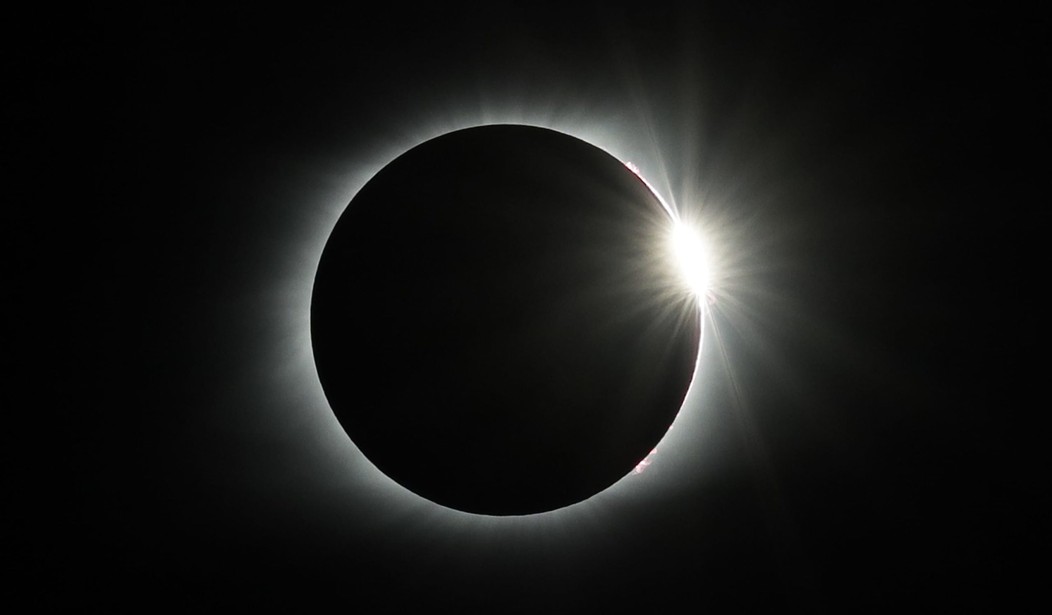On Monday, Americans got to see a rare treat — a total solar eclipse across a broad swath of the continental United States. While that eclipse inspired awe and wonder across the country, it might also furnish a powerful argument for the existence and providence of God.
A total solar eclipse — the phenomenon when the moon completely blocks out the light of the sun for a brief period of time — is a fundamentally unlikely event. Everything has to be “just right.” Eric Metaxas, author of If You Can Keep It: The Forgotten Promise of American Liberty, pointed out just how unlikely this is.
Back in 2002, when “Google was just a gurgling infant,” Metaxas picked up the Encyclopedia Brittanica and compared some figures. First, he found the diameter of the sun (864,576 miles), then the diameter of the moon (2,159 miles), next the distance from the Earth to the sun (93 million miles on average), and finally the distance from the Earth to the moon (239,000 miles on average).
Dividing the sun’s diameter by the moon’s, Metaxas got 400.452. Dividing the distance from the Earth to the sun by the distance from the Earth to the moon gave him 389.121. In other words, the size and distance of each of these celestial bodies is exactly right for a person on Earth to witness a total solar eclipse.
“Of course what this all meant was simply that these immemorially ancient and vast objects, though as different in size as a single BB and a super gigantic beach ball — one that was over six feet in diameter — would from our perspective here on Earth seem almost precisely the same size,” Mataxas noted.
“So if they ever just happened to align in the sky, they would match up perfectly. Not almost perfectly. But perfectly, and bizarrely so,” the author added. This does not seem like a coincidence.
As Metaxas noted, “Almost all the planets in our solar system have no moons or many moons (Jupiter has 60) of incredibly varying sizes. So this sort of thing doesn’t happen anywhere else in our solar system.”
The author described the precision involved in all these calculations as “unbelievable.” He wrote, “The more I thought about it, the more I knew that there was no way this could be a mere coincidence. It seemed almost planned.”
Metaxas suggested a scientific experiment to make this miracle more concrete than abstract mathematics.
Suppose a man held a BB twelve inches from his face and asked a friend to carry a six-foot diameter beach ball (three times the size of a normal beach ball) as far away as necessary, until it appeared exactly the same size as the BB. The friend would have to walk 400 feet — just a little bit longer than a football field — before the two objects would seem to be the same size.
This incredibly unlikely scenario has been witnessed across the globe, many times throughout history. In fact, eclipses have enabled scientists to discover fascinating things about the properties of light.
King David once wrote, “The heavens declare the glory of God, the skies proclaim the works of his hands. Day after day they pour forth speech; night after night they reveal knowledge” (Psalm 19:1-2). Mathematics is the “language” of the skies, and science is the Rosetta Stone allowing men and women to decipher the thoughts of God.
In Christian theology, human beings are made in the image of God. Human minds are specifically designed to think the thoughts of God after Him, able to grasp the laws of morality and the laws of nature. In fact, this very idea — coupled with the idea that God is free to do things however He sees fit — inspired Christians to develop modern science.
Eric Metaxas did not go far enough. A total eclipse of the sun is not just evidence of God’s existence — it’s evidence that He designed the universe for human beings to develop scientific advancements. He pulled the strings for humans to discover a deeper level of truth, and to marvel in the wonders of His creation.
Events like #SolarEclipse2017 show that God not only created the universe, but He fine-tuned it for human discovery. Incredible.
— Tyler O'Neil (@Tyler2ONeil) August 21, 2017
King David’s rapturous discussion of the heavens declaring the glory of God ends in a prayer. David praises God for His righteous law, and prays for forgiveness. “May the words of my mouth and the meditations of my heart be pleasing in Your sight, LORD my Rock and my Redeemer” (Psalm 19:14).
The wonder of the universe humbles Israel’s greatest king, encourages him to acknowledge his own unworthiness to receive such a gift, and inspires him to pursue a relationship with God.
King David saw a Grand Designer behind the universe, and the wonder of a solar eclipse suggests he was on to something. It may be a leap of faith to infer a good God behind such marvels, but it takes an even greater leap to see all this fine-tuning as mere coincidence.








Join the conversation as a VIP Member